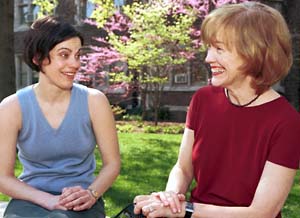The most common thing people at the University say to Alyssa Lonner is, “Slow down!”
With her vigorous physical presence and lively and optimistic personality, Lonner, who will receive a doctorate in Germanic languages and literatures in Arts & Sciences, is a much-appreciated member of that department.
Her energy and enthusiasm are infectious, whether motivating students to learn or integrating new technologies into the classroom.

“Every one of us in the department absolutely adores her,” says Lynne Tatlock, Ph.D., the Hortense and Tobias Lewin Distinguished University Professor in the Humanities, department chair and Lonner’s adviser. “She is just a wonderful all-around person.
“Alyssa combines buoyancy with sensitivity, which makes her an excellent reader and scholar as well as an outstanding teacher. She is a model for a kind of success in the humanities — someone who is multi-talented and does well in everything and is a decent, good human being.”
Lonner’s teaching skill was recognized last year with the Dean’s Award for Teaching Excellence, which includes a $1,350 prize.
In addition, since 1998 Lonner has been a Liberman Graduate Fellow in an interdisciplinary program to train doctoral students to use and integrate technology in their teaching and research. The truly innovative aspect of this program is that the fellows teach other graduate students in a series of summer workshops.
“The Liberman fellows are selected on the basis of their advanced teaching and technology skills and their ability to integrate the two,” says Elaine Berland, Ph.D., associate dean of the Graduate School of Arts & Sciences and program director. “Alyssa contributed immensely to the early development of the summer workshops, particularly in discussions about how to manage the challenges of bringing technology into classroom teaching.
“Alyssa is enthusiastic and makes people very comfortable with taking risks and exploring this new area. She’s terrific.”

A native of western Washington state, Lonner fully intended to go to graduate school in Seattle. Still, she applied to several places, including Washington University because it has a very strong national reputation in German.
“I think when I got accepted to Washington University, I had to look St. Louis up on the map,” she says. “But the letter (written by Tatlock) made an instant impression on me. It was very professional and detailed. After I read the letter, I sent Lynne an e-mail with a couple of questions, and she answered me in minutes. It really sold me on Washington University.
“I am so glad I decided to come to St. Louis.”
Early on, Lonner discovered she liked and was quite good at teaching.
“I suppose there’s something about my personality that makes me like to teach, but I would never have become the teacher I am without the help of the people at Washington University,” she says. “We are lucky in the German department to have a very, very high-powered academic department but also one that takes teaching very, very seriously, in that almost all of our tenured faculty still teach language courses.
“It is ingrained in the graduate students from day one: If you don’t like to teach, if you don’t like undergrads, you’re in the wrong profession.”
Part of what makes Lonner such a standout in the classroom is that she has an affinity for people, whether she is working at Starbucks or as a cocktail waitress (as she did after she earned an undergraduate degree at Western Washington University) or teaching a class of undergrads or fellow graduate students. That interest in other people also served to enliven her scholarly work.
| Graduate School of Arts & Sciences |
Lonner chose to focus her dissertation on author Gustav Freytag, who wrote when Germany, was transforming into an industrialized nation. She wanted to see how that major upheaval affected “everyday, normal people,” rather than the intellectual elite.
That focus led her to read Freytag’s work in a way others had not up to then.
“Alyssa’s sensitivity to detail helped her dig up things and put things together that others had not,” says Tatlock of Lonner’s thesis.
“I enjoy literature and I’m good at it, but I don’t view myself as an intellectual, if that implies elitism and the attitude that I’m smarter than everyone else,” Lonner says. “I’m a normal person. I like to lift weights, go running.
“A big turning point for me was in my second year, when I bought Rollerblades. I did circuits around Forest Park. It was my therapy time.”
Next year, Lonner will be an assistant professor of German at Wake Forest University, where she may trade Rollerblading for horseback riding, but she will continue to give her all in and out of the classroom.